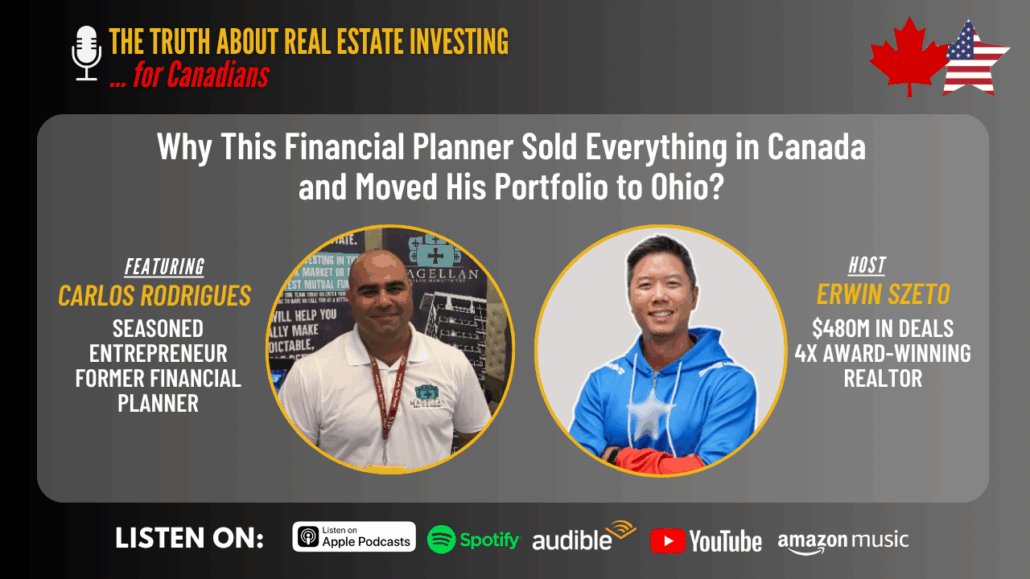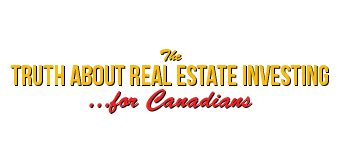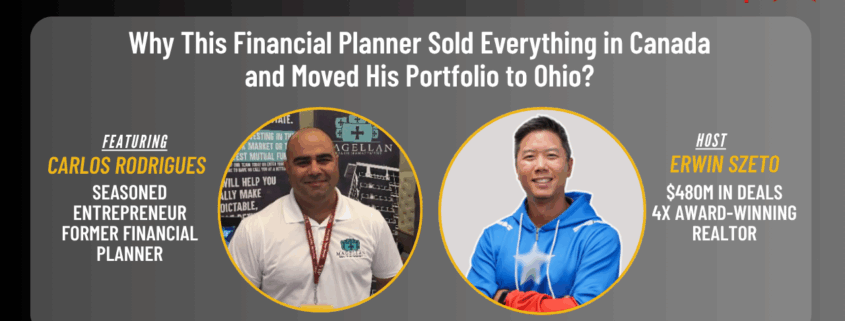From Local Financial Planner to U.S. Landlord: Why Carlos Rodrigues Left Canadian Real Estate

🎧 Podcast: The Truth About Real Estate Investing for Canadians
Featuring Carlos Rodrigues – Financial Planner Turned U.S. Real Estate Investor
🎙️ [Listen to the episode here — https://youtu.be/DyvEbYkl6hg?si=bel1ldCGIiEnKmX5]
Why Carlos Left Ontario Real Estate (and Financial Planning)
After 20 years as a financial advisor—including running his own independent financial and mortgage brokerage—Carlos Rodrigues hit a wall. Like many Canadian investors, he found himself boxed in by tighter lending rules, rising compliance costs, and poor scalability in the Ontario market.
“My most successful year ever—and the bank told me the only mortgage I qualified for was one designed for seniors… A reverse mortgage!”
— Carlos
In 2019, Carlos sold everything: his financial planning practice, his mortgage book, and his real estate portfolio. He exited near the peak, netting a massive gain on a duplex he’d renovated himself. Then he moved his entire strategy south—to Cleveland, Ohio.
Building a Team in the U.S. Was Brutal
Carlos doesn’t sugarcoat the early days. His first Ohio property manager stole $30,000 and vanished. Despite being a licensed financial professional used to due diligence, Carlos says:
“This guy had supposed errors & omissions insurance, government contracts… he still pulled the wool over my eyes.”
He later discovered that dozens of investors—including doctors, lawyers, and even a police officer—had also been scammed. That manager is now reportedly on the run.
Eventually, Carlos rebuilt his team through referrals. He now has a highly responsive, proactive property manager who handles leasing, inspections, and tenant relationships—including navigating the complexities of subsidized housing.
“In Cleveland, they’re either incredibly bad… or phenomenal. There’s no in-between.”
Lead Paint Certifications: A Hidden Risk for Canadian Investors
Cleveland has strict lead-safe regulations, especially for older properties. Carlos learned this the hard way during an attempted eviction:
“You can’t even evict a tenant unless your property is lead-safe certified… and 80% of rental homes older than 1970 aren’t certified.”
A non-compliant property meant months of delays, expensive locksmith visits, and multiple failed inspections. In markets like Cleveland, hyper-local knowledge is essential—something Carlos now brings to his mentorship clients and joint venture partners.
Evictions: Ohio vs. Ontario
Carlos compares Ohio’s eviction process to Ontario’s—and the difference is staggering.
- Ohio: Evictions are done via the courts, not a tribunal. Typical turnaround? 3 weeks.
- Ontario: Professional landlords report 7–8 months, often more for “mom and pop” investors.
“Ohio is a red state. If you’re out of lease, and the landlord wants you out, you’re leaving—one way or another.”
Carlos emphasizes how U.S. systems better balance landlord and tenant rights, making them far more scalable for investors who want predictable cash flow.
Section 8: Why Carlos Welcomes Government-Subsidized Tenants
Carlos specializes in renting to Section 8 tenants—U.S. residents receiving government rent subsidies. While some investors are wary, he says it’s been a major win:
- Rents are 20–30% above market in many zip codes
- Rent is paid directly from the government (tenants can’t intercept it)
- Tenants risk permanently losing their voucher if they’re evicted
“If we ever have another pandemic or recession, my Section 8 rents are still coming in.”
There is red tape—inspections and delays—but Carlos says the stability and returns are worth it.
What Carlos Offers Canadian Investors
Carlos now offers:
- Mentorship programs for Canadians wanting to invest in the U.S.
- Joint venture opportunities for hands-free partners
- Property tours in Cleveland, including visits to turnkey rentals, BRRRRs, and properties under rehab
He helps investors:
- Set up proper U.S. legal entities
- Navigate DSCR financing (no personal income needed)
- Avoid the painful mistakes he made early on
Want to Learn More?
Grab Carlos’s book Property Profits on Amazon:
👉 Property Profits by Carlos Rodrigues
Follow him on Instagram:
👉 @cashflowcarlos
Final Thoughts from Erwin
If you’ve been wondering whether to diversify outside Canada, this episode pulls back the curtain on what it really takes—and why it might be worth it.
“This is why I love doing the podcast. You get the truth—no sugarcoating. Just real investors, sharing real lessons.”
To Listen:
📜 Click to read the full edited transcript
Carlos Rodrigues on Leaving Canadian Real Estate and Going All-In on U.S. Investing
From Financial Planning to Real Estate
I began my career in 2003 as a financial planner with Freedom 55. A decade later, I launched my own brokerage, Magellan Wealth Management. Going independent felt liberating—I was no longer tied to pushing products from just one or two companies. I could finally offer clients what I truly believed was best for them.
That’s when I started looking seriously at real estate.
By the end of my 10-year run, I was frustrated. Despite helping clients manage portfolios of mutual and segregated funds, I found real estate offered more attractive long-term returns, greater control, and significantly better tax advantages.
But the final straw? Even during my most profitable year, I couldn’t qualify for a standard mortgage to refinance my rental portfolio. That was it. In 2019, I sold my practice, exited my Canadian properties, and published Property Profits, a book that shares everything I learned along the way. Then, I went all-in on U.S. real estate.
Why I Chose Ohio and the U.S. Midwest
The U.S. checked every box: better affordability, more landlord-friendly legislation, and strong upside potential. Cities like Cleveland and Toledo reminded me of Ontario 15 years ago—but with better cash flow.
For example, I had purchased a duplex in Ontario for $385,000, spent $60,000 legalizing it, and sold it for $1.1 million. I took those proceeds and started investing across the Midwest. In Ohio, I’ve bought single-family homes for $41,000 to $45,000 and rented them out for $1,100 to $1,200 a month.
Let me be clear: U.S. real estate isn’t “easy”—but it is logical if you do the work.
The Power of DSCR Loans
One of the biggest game changers for me has been DSCR loans—Debt Service Coverage Ratio loans. Unlike traditional mortgages in Canada, DSCR loans don’t rely on your personal income.
There’s:
- No need for tax returns
- No employment verification
- No GDS/TDS calculations
If the property cash flows at a 1.25x ratio or better, you qualify. This alone made it possible for me to scale after hitting a financing wall in Canada.
The Brutal Reality of Team Building
Not everything went smoothly.
My first property manager in Ohio stole $30,000 from me. And I wasn’t new to real estate—I had insurance, contracts, and thought I had done the proper due diligence. This guy even scammed a Cleveland police officer. He’s now on the run.
Eventually, I found a trustworthy property manager through a mortgage broker I trust. She’s become my right hand—proactive, great at communication, and makes sure our Section 8 units are always up to code.
What You Need to Know About Lead Paint Laws in Cleveland
If you’re buying in Cleveland, pay attention to lead safety laws. Any property built before 1978 must be “lead-safe certified.” Without that certification:
- You can’t legally evict tenants
- You risk city fines
- You may face major renovation delays
I once purchased a property where the tenant refused to leave. We couldn’t even start renovations—or begin eviction—until we passed all lead remediation protocols. My advice: buy newer when possible or budget for lead abatement costs upfront.
Evictions: U.S. vs. Canada
Landlord-tenant laws in the U.S.—especially in red states like Ohio—are completely different from those in Ontario.
Here’s how it works in Ohio:
- Serve a 30-day notice
- Follow with a 3-day notice
- Go to court if there’s no resolution
In most cases, you can have a court-ordered eviction in under three weeks. Compare that to Ontario, where professional landlords often wait 7–8 months (or longer) to enforce an eviction.
Why I Embrace Section 8 Tenants
Section 8 housing has a bad reputation, but it’s been a solid strategy for me.
Here’s why I like it:
- Rents are often 20–30% above market
- The government pays you directly
- Tenants can’t just stop paying rent
- Lease violations can mean losing their voucher permanently
Of course, there’s red tape. Inspections can delay move-ins by weeks or even months. But once you’re set up, Section 8 income is consistent—even during economic downturns.
Helping Canadians Invest in the U.S.
Most Canadians have no idea how to get started with U.S. real estate. That’s where I come in.
I offer:
- Mentorship programs to walk investors through their first deal
- Joint venture partnerships where I manage the U.S. side
- Weekend property tours in Cleveland (we typically visit 12–14 homes, analyze them on-site, and finish off with a seafood boil)
I also help clients:
- Set up LLCs and the right U.S. legal structures
- Navigate cross-border tax planning to avoid double taxation
- Build reliable “power teams” on the ground
Want to Learn More?
📘 Check out my book: Property Profits on Amazon
📲 Follow me on Instagram: @cashflowcarlos
BEFORE YOU GO…
Before you go, if you’re interested in what kind of properties I am looking at in the landlord friendly states of the USA please go to iwin.sharesfr.com for what I consider the best investment for most Canadians, most of the time.
I’ve been investing in Ontario since 2005 and while it’s been a great, great run. I started out buying properties in the 100,000s and now it’s $800,000 to $1,000,000. How much higher can it go? I don’t know
To me, the remaining potential for appreciation does not match the risk hence I’m advising my clients to look to where one can find rental properties that are affordable range of $150,000 to $350,000 US$, with rents that range from $1,400 to 2,600/month plus utilities. As many Canadians recognize, these numbers will be positive cash flow and are night and day compared to anything locally. Plus the landlord has all of the rights, no rent control, and income is US dollars which are better than Canadian dollars.
If you don’t believe me, US dollars are better than Canadian dollars, go ask 100 non-Canadians which currency they prefer to be paid in.
So to regain control of your retirement planning. Go to iwin.sharesfr.com and check out what great cash flow properties are available in the USA.
The best part is, my US investments will be much more passive compared to by local investments as I’m hiring an asset manager called SHARE to hand hold me through the entire process. As their client and shareholder, Share will source me quality income properties, help me with legal structure and taxes, they manage the property manager and insurance provider while passing down to me preferred rates so I save both time and money.
Share will even tell me when to strategically refinance or sell. SHARE can even support investors all over the country for proper diversification hence my plan is to own in Tennessee, Georgia, and Texas. Share is like my joint venture partner but I only have to pay them fees while I keep 100% ownership and control.
If your goal in investing is to increase cash flow, I don’t know of a better strategy for most Canadians most of the time. One last time that’s iwin.sharesfr.com to see what boring, cash flowing real estate investing can look like on your path towards financial peace.
This is how I’m going to make real estate investing great again for my family and hope you choose the same. Till next time!
Sponsored by:
This episode is brought to you by me! We don’t have sponsors for this show. I only share with you services owned by my wife Cherry and me. Real estate investing is a staple in my life and allowed me to build wealth and, more importantly, achieve financial peace about the future, knowing our retirement is taken care of and my kids will be able to afford a home when they grow up. If you, too, are interested in my systematic strategy to implement the #1 investment strategy, the same one pretty much all my guests are doing themselves, then go visit www.infinitywealth.ca/events and register for our next event.
Till next time, just do it because I believe in you.
Erwin
W: erwinszeto.com
FB: https://www.facebook.com/erwin.szeto
IG: https://www.instagram.com/erwinszeto/



Leave a Reply
Want to join the discussion?Feel free to contribute!